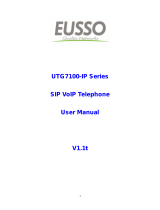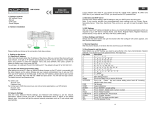
v
Network Status................................................................39
WAN Settings..................................................................40
LAN Settings ...................................................................42
DDNS Setting..................................................................43
VLAN Settings.................................................................45
DMZ.................................................................................47
Virtual Server...................................................................48
PPTP...............................................................................50
3.4.
SIP
S
ETTINGS
............................................................52
Service Domain...............................................................54
Codec..............................................................................58
Codec ID .........................................................................61
Other Settings .................................................................62
3.5.
O
THERS
.....................................................................63
Auto Config......................................................................64
FXO Port .........................................................................65
MAC Clone......................................................................66
Tones...............................................................................67
Advanced ........................................................................68
3.6.
U
SER
P
ASSWORD
.......................................................70
3.7.
S
AVE
C
HANGE
............................................................70
3.8.
U
PDATE
.....................................................................71
Update Firmware.............................................................72
Auto Update Settings ......................................................74
Default Setting.................................................................75
3.9.
R
EBOOT
.....................................................................76
4.
LCD DISPLAY AND KEYPAD ........................................77
4.1.
K
EYPAD
D
ESCRIPTIONS
..............................................78
4.2.
LCD
M
ENU
................................................................80
1.
Phone Book..........................................................80
2.
Call History...........................................................80
3.
Call setting............................................................81
4.
Network ................................................................83























